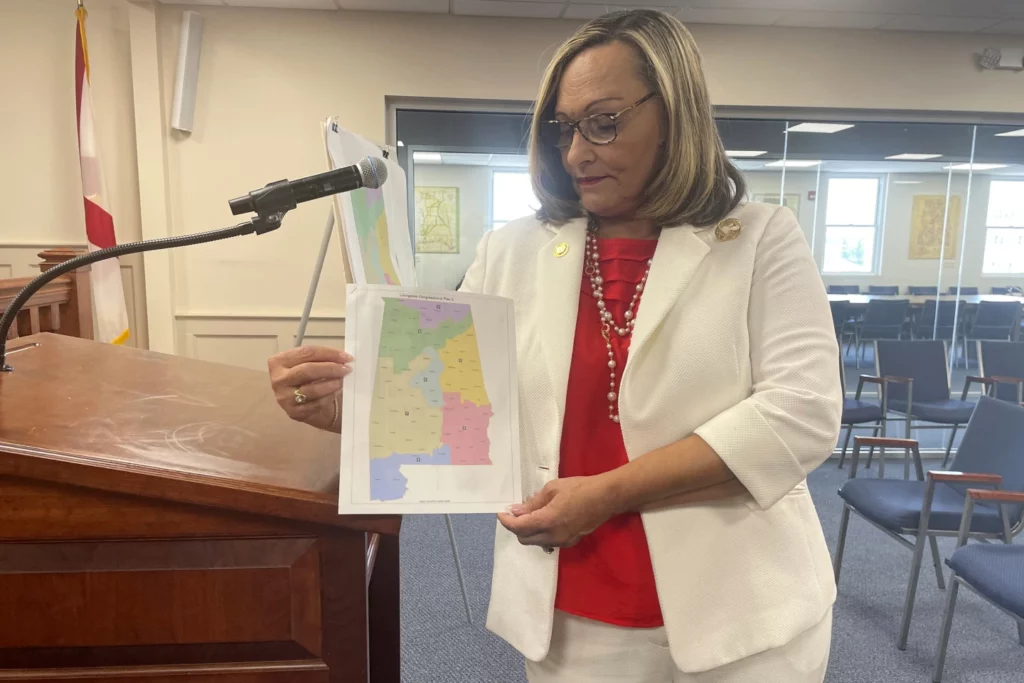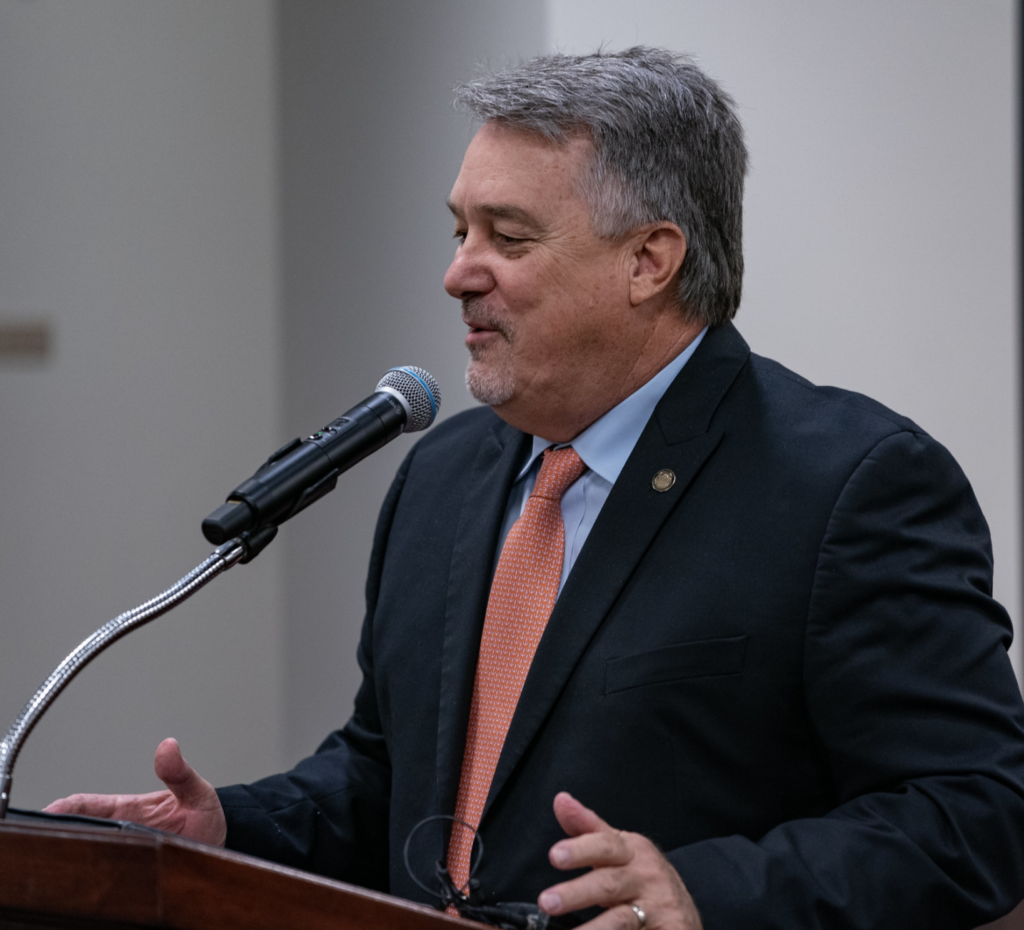After court ruling, Alabama GOP criticized for rejecting 2nd majority-Black congressional district

Alabama Republicans on Tuesday advanced proposals to boost the number of Black voters in one of the state’s seven congressional districts, but critics said the plans flout a court order to create a second majority-Black district or something close to it. Lawmakers must adopt new maps by Friday after the U.S. Supreme Court in June upheld a finding that the current state map — with one majority-Black district in a state that is 27% Black — likely violated the federal Voting Rights Act. Republican-controlled legislative committees on Tuesday voted down proposals to create a second majority-Black district and advanced separate GOP plans that would increase the percentage of Black voters in the 2nd Congressional district from about 30% to either 38% or 42%. That is short of the 50% sought by plaintiffs who won the Supreme Court case. Republicans said their plan complies with the court’s directive to draw a district where Black voters are present in enough numbers to influence the outcome of an election. “They told us draw a map with either an additional majority-minority district or a district that allows Black voters otherwise to elect the representative of their choice. I believe (this) map that you have before you best addresses the issues before the court,” Republican Rep. Chris Pringle told the House committee. Pringle said the district, which would have a Black voting age population of 42% under his bill, would be a swing district that could be won by either a Republican or a Democrat. Senators advanced an amended map where the Black voting age population would be 38% instead of 42% in the 2nd district. Sen. Vivian Davis Figures, a Democratic lawmaker from Mobile, said the Senate proposal is “nowhere close” to what was suggested by the court. She said the district would remain under white Republican control with those numbers. “We don’t think this is going to pass muster with the court,” Figures said. She said the Republicans are headed down a path that will ensure extended litigation, “continuing to spend millions of dollars of taxpayer money just so they don’t give all of Alabama’s citizens a seat at the table for their voices to be heard.” Republicans have been resistant to creating a Democratic-leaning district and are wagering on what the three-judge panel will accept — or that the state will be successful in a second round of appeals. The three-judge panel could step in and draw its own plan if the judges deem lawmakers’ proposal unacceptable. The three-judge panel found that Alabama’s existing congressional map diluted the voting power of Black residents. “The appropriate remedy is a congressional redistricting plan that includes either an additional majority-Black congressional district or an additional district in which Black voters otherwise have an opportunity to elect a representative of their choice,” the lower-court panel wrote in its 2022 ruling. It added that the plan would need to include two districts in which “Black voters either comprise a voting-age majority or something quite close to it.” Senate President Pro Tempore Greg Reed, the Republican leader of the Senate, said lawyers have advised that the Senate plan complies with court order, although “there’s going to be certainly more debate.” He added that those drafting the plan are trying to weigh what is important to the court. “Are you really wanting us to focus on community of interest issues, which they stated in the order? Or are we looking at voting populations? Which one is more important?” Reed said. The proposals head to their first floor votes on Tuesday. The three-judge panel that blocked the use of the current map gave Alabama until Friday to submit a new plan for review. Rep. Barbara Boyd, a Democratic lawmaker from Anniston, said Alabama has a long history of “refusing to do the right thing.” “Don’t continue to allow the courts to have to force us to do what we know is right,” Boyd told her colleagues on the House committee. Republished with the permission of The Associated Press.
Public meetings on congressional redistricting announced

On Wednesday, State Sen. Steve Livingston (R-Scottsboro) and State Rep. Chris Pringle (R-Mobile), who serve as the joint chairs of the Permanent Legislative Committee on Reapportionment, announced a series of meetings and deadlines on the looming congressional redistricting. The first meeting will be on June 27 at 1:30 P.M. in the Alabama State House Room 200. This will be a meeting of the Joint Committee and a public hearing. People unable to attend can watch the proceedings online at the Legislature’s website. July 7 at 5:00 P.M. is the deadline for all plans to be submitted to the Reapportionment Committee. You can contact the committee directly by email at: district@alsenate.gov. The committee will meet again and hold a public hearing on July 13 at 1:30 P.M. in State House Room 200. On August 14, there will be a hearing at Hugo L. Black United States Courthouse in Birmingham. The House members serving on the Permanent Legislative Committee on Reapportionment members include Cynthia Almond (R-Tuscaloosa); Barbara Boyd (D-Anniston); Jim Carns (R-Birmingham); Steve Clouse (R-Ozark); Corley Ellis (R-Columbiana); Chris England (D-Tuscaloosa; Laura Hall (D-Huntsville); Sam Jones (D-Mobile); Joe Lovvorn (R-Auburn); and Rex Reynolds (R-Huntsville). In 2022 a three-judge panel of the Eleventh Circuit Court of Appeals rejected Alabama’s 2021 congressional redistricting as being in violation of the Voting Rights Act of 1965—the U.S. Supreme Court, which earlier this month agreed. The three-judge panel has given the Legislature until the middle of next month to submit a new congressional redistricting plan to the federal court. The three-judge panel has ordered the Legislature to submit a new map with two majority-minority districts or something as close to that as possible. Alabama Governor Kay Ivey is expected to call a special session no later than July 17 to attempt to comply with the court order. If the Legislature cannot reach an agreement on a redistricting plan by July 21, or the Court does not like the State’s plan, then the three-judge panel may appoint a special master to draw the districts for the State. Republicans currently control six of Alabama’s congressional seats, while Democrats control only the Seventh Congressional District. None of the seven congressional races were competitive during last year’s general election. The redistricting could make two of those districts winnable for Alabama Democrats. It could also cost Democrats a seat if they make it too competitive. To connect with the author of this story or to comment, email brandonmreporter@gmail.com.
Nathaniel Ledbetter announces appointments to the Reapportionment Committee

On Tuesday, Speaker of the House Nathaniel Ledbetter announced that he had appointed a number of House members to serve on the Permanent Legislative Committee on Reapportionment. The House members appointed are: Cynthia Almond (R-Tuscaloosa) Barbara Boyd (D-Anniston) Jim Carns (R-Birmingham) Steve Clouse (R-Ozark) Corley Ellis (R-Columbiana) Chris England (D-Tuscaloosa) Laura Hall (D-Huntsville) Sam Jones (D-Mobile) Joe Lovvorn (R-Auburn) Chris Pringle (R-Mobile) Rex Reynolds (R-Huntsville). Since this is a joint committee, it is also made up of members of the Senate. The appointment of 11 members from the House would indicate an expansion of the committee. According to the committee website, the joint committee has just six members: Sens. Steve Livingston, Dan Roberts, and Bobby Singleton, and Reps. Kyle South, Laura Hall, and Chris Pringle. South is leaving the Legislature at the end of the month to accept a position as President and CEO of the West Alabama Chamber of Commerce. Presumably, the Senate will now appoint another eight joint committee members. The Joint Committee on Reapportionment normally redistricts the congressional districts, the state board of education districts, and legislative districts every ten years following the decennial census. In 2022 a three-judge panel of the Eleventh Circuit Court of Appeals rejected Alabama’s 2021 congressional redistricting as being in violation of the Voting Rights Act of 1965. Alabama appealed to the U.S. Supreme Court, which earlier this month found that the lower court was correct in its interpretation and has restored the lower court’s ruling that the state is in violation of the Voting Rights Act. The three-judge panel has given the Legislature until the middle of next month to submit a new congressional redistricting of the state to the federal court. The three-judge panel has ordered the Legislature to submit a new map where there are two majority-minority districts or something as close to that as possible. Alabama Governor Kay Ivey is expected to call a special session no later than July 17 to attempt to comply with the court order. If the Legislature cannot reach an agreement on a redistricting plan by July 21 or the Court does not like the State’s plan, then the three-judge panel may appoint a special master who will draw the districts for the state. Republicans currently control six of Alabama’s congressional seats, while Democrats control only the Seventh Congressional District. None of the seven congressional races were competitive in the general election last year. The redistricting could make two of those districts winnable for Alabama Democrats. To connect with the author of this story or to comment, email brandonmreporter@gmail.com.
House passes legislation making changes to the public charter schools statute

On Thursday, the Alabama House of Representatives passed legislation making several changes to the Alabama Public School Charter Commission. House Bill 363 (HB363) is sponsored by State Representative Terri Collins. The Alabama School Choice and Student Opportunity Act changes the appointment process for the Alabama Public Charter School Commission; authorizes the Commission to hire staff; requires commissioners to receive annual training; provides additional guidelines for the authorizing and application review process; provides further for the operational and categorical funding of public charter schools in their first year of operation; and clarifies the per pupil federal, state, and local funding of conversion public charter schools during their first year of operation. “All charter schools are public schools,” explained Rep. Collins. “We have three conversion schools in Montgomery, Mobile, west Alabama, Birmingham has a few, Fairfield, and there are a couple more in Montgomery.” “A public system could choose to make a starter school,” Collins stated. “If they have a specific need, they can do it through the charter process.” Collins explained how a public system can convert a failing public school to a charter public school through the formal conversion process. Rep. Tracy Estes thanked Collins for bringing the bill and the hard work in crafting the substitute. The House voted to adopt the negotiated substitute version of the bill to address issues that some members had with the original legislation in a 88 to 13 vote. Rep. Mark Gidley said, “I want to express my appreciation for how you have worked hard on this.” Rep. Jamie Kiel brought an amendment that would restore the local school board as an authorizer. An earlier version of the bill removed that. This amendment was ratified. “I appreciate you working with all of the parties on this,” Kiel said to Collins. Rep. Barbara Boyd said, “I want to thank you for where you have gone and for working with all of the parties, but I would still have preferred magnet schools because those are set aside for specific purposes. I am going to have to vote no today.” “They have to be nonprofit,” Collins said of charter schools. “They can’t be a for-profit. They have to have local support.” Rep. Laura Hall said, “African American boys have a great need, particularly between K and 3irth grade.” Hall said that she had visited the new aviation-focused charter school in Fairfield. “I have been there,” Collins said. “What they are doing is very exciting.” Collins said that students there can work on actual planes and “learn takeoff and landing through a simulator.” Hall said, “The dollars that the system has used sound like they are very well used.” Collins said, “They do everything that a public school does. They do ACAP. They give grades.” Collins said that members of the Commission would be appointed by the governor, the lieutenant governor, the Speaker of the House, the Senate Pro Tem, the House Minority Leader, and the Senate Minority Leader. “They look at applications, and they approve or disapprove,” Collin said of the Commission. “This extends their term from two years to four years.” Rep. TaShina Morris suggested changing the bill so that the state superintendent of education hires the Commission staff. Collins said, “No, we want the commission to choose their own employees.” Rep. Mary Moore said, “I don’t think the state of Alabama can support multiple forms of public schools with one pot of money for education.” Moore complained that the local school board can deny a charter application and “the state of Alabama will go ahead and authorize them to be a charter school when they know they are deficient.” Moore attacked the performance of charter schools. “They (students) are coming back to public schools, and they are not able to do the work,” Moore said. “They are not doing their due diligence. They are not hiring proper teachers. They have teachers that don’t even know how to set up a proper classroom.” Collins replied, “They all have a long waiting list to get in. I don’t know of any who are coming back.” Moore said, “They are taking dollars from the public schools, and they are hurting public schools because they are taking resources.” Collins said, “Charter schools are public schools.” The Alabama House passed HB363 in a 76 to 25 vote. The legislation now goes to the Senate for their consideration. Thursday was day 20 of the 2023 Alabama Regular Legislative Session. The House convenes at 1:00 p.m. on Tuesday. To connect with the author of this story or to comment, email brandonmreporter@gmail.com.
House committee advances bill to overhaul Alabama’s adoption laws

On Wednesday, the Alabama House Children and Seniors Advocacy Committee gave a favorable report to a bill to replace Alabama’s existing adoption statutes with new code language that sponsors claim will make the adoption process faster, less burdensome, and more affordable. House Bill 101 (HB101) is sponsored by State Representative Ginny Shaver, who Chairs the committee. “This a Law Institute (ALI) bill,” Shaver said. “I started working on a bill and found out that they already had a committee working on rewriting the state’s adoption code.” “The committee has worked for over four years,” Shaver explained, “The Committee has brought in stakeholders from all over the adoption field.” “I started working with the committee in 2021, not to write the bill, but to learn,” Shaver said. “Alabama’s adoption law has not been touched in 30 years.” Shaver said the rewritten 80-page bill “is very comprehensive and detailed.” “The goal was to update the language and streamline the process and protect the confidentiality of the parties,” said Shaver. “To put it as simply as I can, this bill repeals that current adoption code and replaces it.” Shaver said that the new legislation divided minor adoptions versus adult adoptions. It also clarifies which court is the proper court, allows courts handling adoptions to work together and communicate, allows for electronic communication, provides rules for a contest of adoptions in certain situations, and clarifies procedures about relatives and stepparents who adopt a minor. “My concern about adoption is to make it simpler and also to save time and money,” Shaver said. “We want to do everything possible to get a child into a permanent home as soon as possible.” “This streamlines the process and provides clarity to make it better going forward,” Shaver said. State Rep. Barbara Boyd said, “When you are changing codes, you really don’t know what we are voting on unless you are an attorney. I read the whole bill, but I still don’t understand it. In my opinion, it is not a good job.” “We did have a summary, and the Law Institute did provide answers to questions after each section,” Shaver said. State Rep. Randall Shedd, “I want to thank you for your work. A lot of people worked hard on this bill. It may not be a perfect bill, but it is real close to it.” State Rep. Barbara Drummond told reporters at a minority caucus press event afterward, “This bill is a Law Institute bill that overhauls the whole code on adoption.” The committee voted to give HB101 bill a favorable report as amended. The committee also voted to give a favorable report to House Bill 103 (HB103), which is sponsored by State Rep. Allen Baker. “This is an adoption-related bill,” Baker said. “This bill would authorize sick leave for state employees to deal with issues related to adoption.” Boyd asked, “How does this bill differ from current law?” “This clarifies more than changes,” Baker said. “This adds clarity. To this point, this has been up to the discretion of the agency.” Drummond asked, “Is higher ed in there?” Baker said the community college system and four-year higher education institutions were included. Two technical amendments were approved by the committee. HB103 received a favorable report from the Committee in a unanimous vote. Both HB101 and HB103 could be considered by the full House of Representatives as early as Thursday. Thursday will be day four of the 2023 Alabama Regular Legislative Session. Regular sessions are limited to no more than thirty legislative days. To connect with the author of this story or to comment, email brandonmreporter@gmail.com.
Steve Flowers: Incumbency prevails in 2022 State House races

Folks, believe it or not, we are closing in on six months before next year’s election year. The primary election is set for May 24, 2022. In Alabama, all our major constitutional officers are on the ballot next year. The governor’s office is the premier race in the state, and that coveted and powerful post is set for its four-year quadrennial run. Therefore, this big political year is referred to as the gubernatorial year. Those of us who follow Alabama politics have been salivating with anticipation for a cavalcade of great races. However, the power of incumbency has devasted the big year into a yawn. All the major state offices are held by popular incumbents, who are either running unopposed or have minimal opposition. The consolation prize was that there would be the legislative races. After all, this is where the real power in the state rests. You can simply look at where the special interest and PAC money is spent to verify that fact. However, the omnipotent power of incumbency has also encroached on those races. The Alabama House of Representatives has 105 members. There are 77 Republicans and 28 Democrats. The large majority of incumbents are running for reelection – both Republicans and Democrats. The overwhelming majority of these incumbents will have no opposition. However, in the House, there will be some major changes in leadership because of retirement or moving on to new posts. Speaker of the House Mac McCutcheon is not running for reelection. This has created an interesting and spirited race within the Republican Caucus ranks for Speaker. In addition, Victor Gaston of Mobile, who is Speaker Pro Tem, is also retiring. Bill Poole of Tuscaloosa, who chaired the powerful House Ways and Means Education Budget Committee, has left the House to be the State Finance Director. House Rules Committee Chairman Mike Jones of Andalusia is running for the open Senate seat of retiring Senator Jimmy Holley. Two of the freshman House members are running for statewide office. Wes Allen of Troy is running for Secretary of State, and Andrew Sorrell of Tuscumbia is running for State Auditor. In addition, Connie Rowe of Jasper is leaving the House to become an administrative assistant to Lt. Gov. Will Ainsworth. Some of the veteran House members who are choosing to hang up their legislative cleats include Howard Sanderford of Huntsville, Mike Ball of Huntsville, K.L. Brown of Jacksonville, Kerry Rich of Marshall, Allen Farley of Jefferson, Harry Shiver of Baldwin, Mike Holmes of Elmore, and Becky Nordgren of Etowah. The most noteworthy retiree may be Representative Steve McMillan of Baldwin County, who is retiring after serving close to 43 years in the House. Steve has been a quiet yet very effective voice for the people of Baldwin County. They all will be missed. Some of the high profile and powerful members of the House, who will return for another four years with no or token opposition, are Steve Clouse of Ozark, Nathaniel Ledbetter of Dekalb County, and Danny Garrett, Jim Carns, David Wheeler, and David Faulkner of Jefferson. Danny Garrett has ascended to Chairman of the House Ways and Means Education. Other leaders returning are Chris Pringle, Reed Ingram, Randall Shedd, Tracy Estes, Chris Sells, David Standridge, Ginny Shaver, Jim Hill, Alan Baker, Joe Lovvorn, Chris Blackshear, Kyle South, Paul Lee, Jeff Sorrells, Rhett Marques, Steve Hurst, Joe Faust, and Margie Wilcox. The Democratic leadership will remain intact. There is an illustrious array of House Democratic leaders, including Anthony Daniels, Chris England, Laura Hall, Peb Warren, Barbara Boyd, A.J. McCampbell, Berry Forte, Dexter Grimsley, Thomas Jackson, Kevin Lawrence, Mary Moore, Juandalynn Givan, and veteran John Rogers. Two of the Democratic House veterans from Jefferson County, Louise Alexander and Merika Coleman, are both running for an open Jefferson County Senate Seat, leaving both their House seats up for grabs. There may be an increase in the number of females in the House of Representatives. It has already begun with the election of Cynthia Almond of Tuscaloosa, who was elected without opposition to replace Bill Poole. In addition, Patrice Penni McClammy won the Montgomery District 76 seat of her late father, Thad McClammy. She won with no opposition. See you next week. Steve Flowers is Alabama’s leading political columnist. His weekly column appears in over 60 Alabama papers. He served 16 years in the state legislature. Steve may be reached at www.steveflowers.us.
Push for greater equality: Adline Clarke proposes ‘gender pay gap’ bill

It’s a fact: women earn less than men. According to the U.S. Department of Labor, women who worked full-time, year-round in 2014 earned on average, 79% of men’s median annual earnings. That’s not sitting well with one Alabama lawmaker who’s hoping her gender pay gap legislation makes it across the finish line as the 2018 legislative session nears its close. HB368, sponsored by Mobile-Democrat State Rep. Adline Clarke, would prohibit employers from paying their employees less than the wage they would pay a member of the opposite sex for a similar job or responsibilities when viewed as a composite of skill, effort, and responsibility, as specified. Alabama is one of only two states, along with Mississippi, without an equal pay law. “Nearly every state has a law prohibiting employers differently based solely on gender. I’m disappointed. I would have thought we would have passed a long long before now,” Clarke told AL.com “Timing is everything.” However, HB368, also known as the “Gender Pay Gap,” would not just make wage inequality illegal, but would also add several provisions to the law including: Requires an employer to affirmatively demonstrate that a wage differential is based upon one or more specified factors Prohibits an employer from discharging, or in any manner discriminating against. or retaliating against an employee for the enforcement of these provisions Provides for enforcement of the bill Provides that an employer may not prohibit an employee from disclosing the employee’s own wages, discussing the wages of others, inquiring about another employee’s wages, or aiding or encouraging any other employee to exercise his or her rights under these provisions And requires an employer to maintain a record of wages paid to his 15 or her employee for a certain amount of time. The proposal, filed on Feb. 1, is scheduled to appear before the Alabama House State Government Committee on March 21. Alexander City-Republican State Rep. Mark Tuggle, the committee’s chairman, hopes to have Clarke’s proposal on the committee agenda next week. The bill currently has 26 co-sponsors, both Republicans and Democrats: Autauga County-Democrat Kelvin Lawrence Mobile County-Democrat Barbara Drummond Barbour County-Democrat Barry Forte Perry County-Democrat Prince Chestnut Jefferson County-Democrat Rolanda Hollis Madison County-Democrat Anthony Daniels Jefferson County-Democrat Rod Scott Tallapoosa County-Democrat Pebblin Warren Choctaw County-Democrat Elaine Beech Madison County-Democrat Laura Hall Jefferson County-Democrat Merika Coleman Jefferson County-Democrat Mary Moore Mobile County-Democrat Napolean Bracy Blount County-Republican Connie Rowe Shelby County-Republican April Weaver Talladega County-Democrat Barbara Boyd Jefferson County-Democrat Juandalynn Givan Etowah County-Republican Becky Nordgren Morgan County-Republican Terri Collins Montgomery County-Democrat John F. Knight Montgomery County-Democrat Thad McClammy Tuscaloosa County-Democrat Artis McCampbell Mobile County-Democrat James Buskey Bibb County-Democrat Ralph Howard Lauderdale County-Democrat Marcel Black Houston County-Democrat Dexter Grimsley


